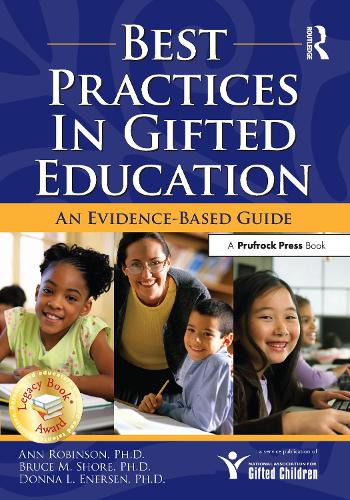
Best Practices in Gifted Education: An Evidence-Based Guide
(Paperback)
Publishing Details
Best Practices in Gifted Education: An Evidence-Based Guide
By (Author) Ann Robinson
By (author) Bruce M. Shore
By (author) Donna Enersen
Prufrock Press
Prufrock Press
15th October 2006
United States
Classifications
Tertiary Education
371.956
Physical Properties
Paperback
302
Width 178mm, Height 254mm
557g
Description
A gifted education Legacy Award winner, Best Practices in Gifted Education provides concise, up-to-date, research-based advice to educators, administrators, and parents of gifted and talented youth. The 29 practices included in this volume are the result of an extensive examination of educational research on what works with talented youth. The interest in culturally diverse and low-income learners, the means to identify talents, and the need for curriculum that appropriately challenges high-ability youth constitute just a few of the 29 practices.
Each practice is organized into a chapter containing two sections: What We Know and What We Can Do. The first section briefly describes the practice and summarizes the research. The second section suggests what course of action a parent, teacher, or administrator might take at home, in the classroom, or at school. The book is a must-have for those who want a guide that makes a connection between research and practical action in gifted education.
A service publication of the National Association for Gifted Children (Washington, DC). This designation indicates that this book has been jointly developed with NAGC and that this book passes the highest standards of scholarship, research, and practice.
Reviews
Have you, as a parent or teacher of gifted children, wondered what you can do to encourage the academic and emotional growth of these children If so, this is the book for you . . . The chapters of the book are based upon a wide range of issues surrounding gifted education, covering preschool to entrance into college. The chapters explore the issues from different points of view, using a thorough literature review. The authors then summarize each topic, drawing conclusions as to best practices. The chapters conclude with suggestions as to what can be done to support the gifted child at home, in the classroom, and in school-based settings.,Victoria Brown,Childhood Education, 4/1/08
The authors, veteran teachers, specialists in gifted education, and a committee of other experts in the field, have conducted extensive research and examined volumes of evidence in identifying 29 practices that best serve gifted children throughout their educational experiences at home, in the classroom, and within the community. The book, a service publication of the National Association of Gifted Children, is easily accessible, . . . [and] there are concrete, practical suggestions throughout . . . Best Practices does offer valuable information and useful suggestions for parents and provides a springboard for communication and collaboration between parents, teachers, and administrators to ensure a rich and appropriate comprehensive gifted education.,Sarah Boone,Duke Gifted Letter, 12/1/08
Based on an extensive examination of research, Best Practices in Gifted Education provides the framework for effective planning and instruction in teaching gifted children. Included in the timely and important topics addressed in this text are parent involvement, twice-exceptional students, gender differences, school programs, inquiry-based learning and teaching, acceleration, and culturally diverse student populations. By closely examining the contents of this book, all stakeholders will be prepared to make well-informed decisions in planning for educational opportunities offered to gifted children.,Gifted Child Today, Vol. 30, No. 1, 12/1/07
Author Bio
Ann Robinson is professor of education and founding director of the Center for Gifted Education at the University of Arkansas at Little Rock. She is a former editor of Gifted Child Quarterly, serves on the board of directors for the National Association for Gifted Children as the finance secretary, and has received the Early Leader and the Early Scholar Awards from the association. In 2004, she and coauthor Sidney Moon received the Gifted Child Quarterly Paper of the Year Award for "The National Study of State and Local Advocacy in Gifted Education." With Shore, Cornell, and Ward, Robinson coauthored Recommended Practices in Gifted Education: A Critical Analysis, identified as one of the 50 most influential works in gifted education by a division of the National Association for Gifted Children. She was a charter board member of the Special Interest Group on Giftedness and Talent of the American Educational Research Association. In 2000, Robinson was recognized as the Purdue University Alumna of Distinction for the College of Education. Her own institution honored her with the University Award for Public Service in 2001. Robinson is the president of the Arkansans for Gifted and Talented Education, the immediate past president of the Arkansas Association of Gifted Education Administrators, and is active in advocacy at the state and national levels. In 2006 she received the NAGC Distinguished Service Award.
Bruce M. Shore is professor of educational psychology in the Faculty of Education at McGill University in Montreal, where he also has served as chair of the department and dean of students. His research has addressed the ways in which gifted students think and learn differently from other students, how the development of giftedness parallels that of expertise, and understanding learning processes in inquiry-driven environments. He and his graduate students currently are focused on such topics as interprofessional education and practice, inquiry in teacher education and undergraduate science education, how research ideas arise, and the identification and evaluation of the outcomes of inquiry-based teaching and learning. He has a bachelor's degree in mathematics and chemistry (with psychology), a teaching diploma in secondary mathematics and science, a master's degree in education from McGill University, and a Ph.D. in educational psychology from The University of Calgary.
